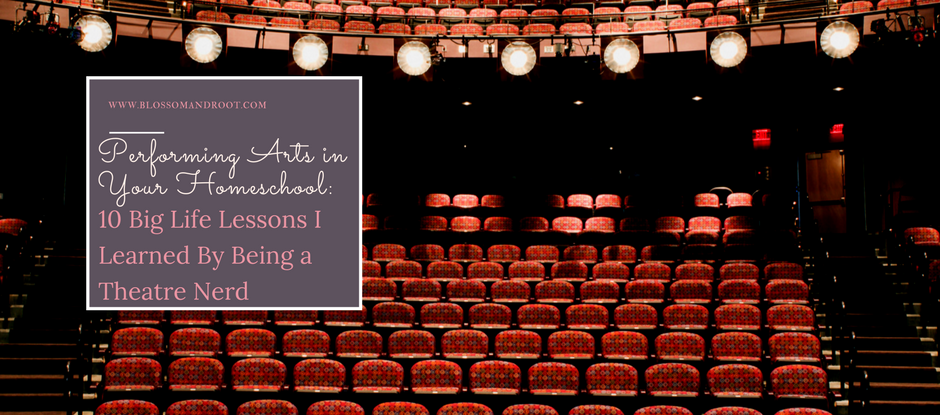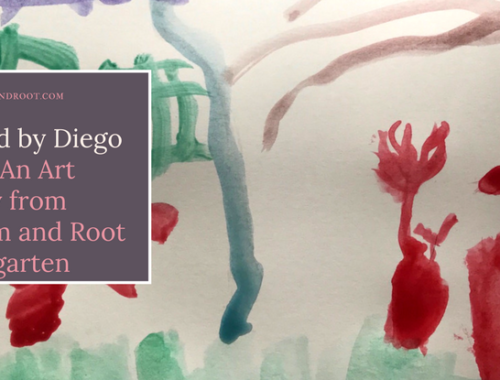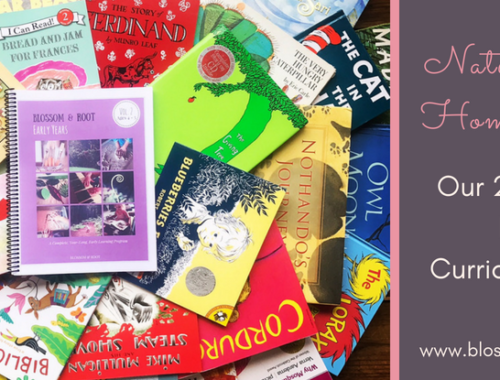In As You Like It, Shakespeare famously penned:
“All the world’s a stage,
And all the men and women merely players;
They have their exits and their entrances,
And one man in his time plays many parts…”
The older I get, the more truth I see in these words–especially in the last line.
I grew up with theatre. Theatre was the shinning beacon of purpose in my public school education. I was lucky–I went to a school that valued the arts, encouraged it with both staff and funding, and provided ample opportunities to invest oneself fully in theatre, music, visual art, dance, and writing. I had parents that cheered me on, picked me up late into the night after rehearsals, and knew what to say when I didn’t get the part I wanted. I was surrounded by talented, hard-working classmates that loved the theatre, and loved one another. We were a family. We fought with each other like siblings, but we also protected and encouraged each other like them. The days and nights I spent in the theatre were, far and away, the most important part of my formative education.
But I didn’t realize how much I was learning until much later in life. Since high school, I’ve “played many parts.” Since then, I’ve been a theatre major and a paid actor, yes, but I’ve also been a garden designer, a kindergarten teacher, an artist, an entrepreneur, a waitress (for a week), a wife and a mother, a blogger, a magazine editor, and homeschooler. I’ve tackled big goals, had set-backs, adapted to many circumstances, and been through many seasons of friends and lifestyles. The lessons I learned in the theatre have been with me, every step of the way.
Some of the most important life lessons I ever learned, I learned them on and off the stage. And these have had a tremendous impact on the way I approach my current role as a homeschooling mom.

No. 1: The Process Matters More Than the Product
Theatre is not just about the play. It’s about what happens to the actors and the crew during the play. It’s about what happens to the audience when they’re watching the play. It’s not a product, not a singular moment of “now it’s done, here it is.” It’s a process. It’s a thing that happens with you and within you, whether you’re on stage, back stage, or watching the stage.
The same is true of education. Learning is not something that we work toward so that we can say, at the “end” of it, that we did it and we’re done. If we’ve done our job well, then it’s never over. Learning is all process, and little product. The juiciest, most important part of learning is what happens within you while you’re at it.

No. 2: The Individual Strengths Within a Collective Can Make Big Things Happen
Great theatre happens because great individuals work together to make it happen. Rarely is it a one-man operation. And the most powerful art is born from visionaries that know how to bring the individual strengths of many into one singular focus. In many ways, public education is designed to create generalists, but neglects the power of the specialist. Look at all of the great minds of the past that have made an enormous impact through their remarkable, and highly specialized, strengths: Einstein, Edison, Beatrix Potter, Richard Branson, Michael Faraday, Mary Anning, Gregor Mendel, and so many others. Many of them had little to no formal education to speak of.
Homeschooling, especially “unschooling”, is one of the best options available for a child with a specialized mind. It gives them the freedom to dive deep into their interests, while eliminating the pressures and distractions of a traditional education. While some highly-passionate or gifted children are able to thrive within traditional education, many are not. We need those children, too. We need them to retain their love for learning, to take their time cultivating their gifts, and to grow up to contribute their unique strengths to our collective.
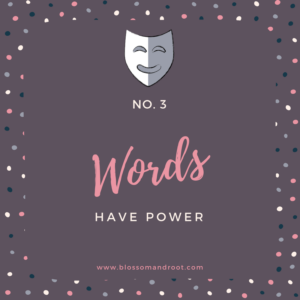
No. 3: Words Have Power
Theatre teaches you to love and respect the power of words. From Henry V’s St. Crispin’s Day speech to Oscar Wilde’s quotable nuggets–“the truth is rarely pure and never simple”–theatre is positively filled with important, emotional, powerful, and resonant words. And their power goes beyond the stage–evident when playwrights and poets are often the first to be silenced or imprisoned during times of political unrest.
Words matter. They matter when we use them with others, and they matter when we use them within ourselves. If you want your child to fall in love with words, or at least to know and understand their power, take them to the theatre!

No. 4: You Get to Decide Whose Opinions Matter
If you’re going to be an actor, artist, writer, director–really, anybody who puts themselves out there, creatively–you’re gonna have to develop a thick skin, if you want to live a happy life. This is truly easier said than done, and it takes years (for most people.) But there’s a little hack you can employ, and the faster you learn it, the better off you’ll be. The hack? You decide whose opinions matter.
You see, if you let Random Patron Patty’s opinion of your performance get into your head, it has a tendency to stick around awhile, and can do some serious damage concerning your conviction and self-worth. But Patty is just one person, and really–in the grand scheme of things–her opinion doesn’t really hold much weight. This is something homeschoolers come up against constantly–the strong (and often misinformed) opinions of random strangers, family, teachers, and community members. Use the hack.
You get to decide whose opinions matter to you, and that decision should be made against the bigger picture, or the reason why you decided to homeschool in the first place. Does Rude Rhonda in the grocery store line really get a say when it comes to your child’s future? I think not. Does it really matter that Noisy Neighbor Nelly thinks “all homeschooled children grow up to be weird and unsocialized”? Nope, it doesn’t.

No. 5: Movement Aids Learning
I used to think I had a terrible memory. Play after play I struggled to learn my lines before we started rehearsals. If Shakespeare was involved, forget it. Then I worked with a director that forbade us to learn our lines before we’d blocked the show (put in all of the movement and action) and rehearsed for weeks. I sat down to work once we were allowed to memorize and found I already had. I knew every word. I was bewildered. I had a ton of lines in that particular show. And I knew all of them, without even trying to learn them.
I realized very quickly that this had everything to do with the fact that the lines had been imprinted with movement. The movement changed the way my brain worked. As a kindergarten teacher, I observed, again, the power that movement had when it came to learning. A child may have struggled for weeks over skip-counting, but the moment I made up a goofy song and dance to teach it, they knew it without trying. This was particularly true of my more kinesthetic learners. Rather than bark “sit still!” over and over at them, I encouraged them to stand up while they worked, or to keep a pile of play-dough beside them. Movement and learning go together hand-in-hand. It’s no wonder that, as recesses get shorter and PE programming is completely pushed out of school budgets, we have more and more children struggling to pay attention or retain information.

No. 6: Use What You’ve Got
No one is more creatively resourceful than a director with no budget. I’ve been in shows that were performed in a stairwell, with no costumes and a pair of moth wings made out of coat hangers as the only prop. In the arts, no funding is ever guaranteed, but that doesn’t stop the motivated from getting the job done.
Homeschooling can get expensive. Curriculum can cost an arm and a leg. Supplies can run up a small fortune. But it can also be extremely budget-friendly, even free, if you’re willing to get creative and work with rougher edges. Sometimes, you just have to work with what you’ve got. And many times, working with less–and thereby forcing yourself to really focus on what matters–concentrates the results ten-fold. There’s no flashy extras to distract you or prop you up–you get down to business in a hurry.
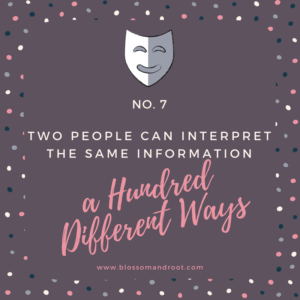
No. 7: Two People Can Interpret the Same Information a Hundred Different Ways
I wrote a play in my junior year of college, which was handed to a student director during my senior year. She loved the play, and invested herself for the good part of year into making it come to life. In my youth, her interpretation astounded and, frankly, crippled me. It was nothing like what I saw in my mind when I wrote it. Unrecognizable. I was angry, hurt, and bewildered by it. Years later, I found a letter she had given me on the opening night, which I had never opened. She thanked me earnestly for letting her, and her cast, use my words and my ideas. She included pictures of their process. Her message was heartfelt and so touching. Maybe it was because I was a little older, a little more distant from that moment when it mattered so much, but it taught me a really important lesson.
We all see the world through our own lenses. We see everything through our unique experiences, our pain and our triumphs, our own individual light. Her interpretation of those words were worlds apart from mine, and that was likely true of each one of her cast members, and each audience member that attended it as well. Same words, different meaning. Same story, different context. This is such an important truth we must understand as we move through the world and educate our children.
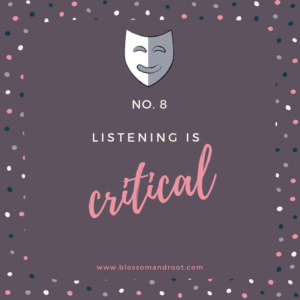
No. 8: Listening is Critical
Any actor worth their salt will tell you that listening is where the real magic happens. It’s often the very first mark of the seasoned actor versus the amateur. In Waiting for Guffman, Catherine O’Hara’s character hilariously mouths her husband’s lines as he is speaking, rather than actively listening (as her character) to what he is saying. How often we do this in real life–fill in the spaces while someone is talking until we get to talk again, speaking “for” the other person in our own minds and thoughts, instead of really hearing what they have to say.
I’ve been caught off-guard more than once by my children and their thoughts and feelings when I actually stopped what I was doing to actively hear them. I have been stunned to realize that they were deeply curious about books I’d felt were boring them, or to find them confused by a concept I’d assumed they’d already mastered. In our effort to stay on our toes as home-educators, we can sometimes forget to take our cues directly from the source. Sometimes this requires a lot more than hearing their words. Their body language and behavior can tell us so much, but we have to be really tuned in to catch it.

No. 9: Talent is Great, Hard Work is Better
It’s a cliche, but it’s true–talent will only carry you so far. In theatre, a degree of natural talent really is necessary, but that’s just a ticket to the first gate. Once you swim into larger waters, you quickly find yourself surrounded by talent equal to, or greater than, your own. So your natural talent ceases to be the skeleton key it once was. You have to be willing to work harder, stay up later, improve your weaknesses with more commitment, hone your strengths with more conviction, network yourself more aggressively, and humble yourself more willingly than any of the other players on the field if you really want to make it.
Talent counts, it’s true. But hard work is something you can really bank on. The guy next to you might be more naturally gifted, but if you can tell yourself, honestly, that you can outwork him any day of the week, you’ve got a better chance at succeeding. Time and time again, we hear of athletes and performers who were told they didn’t have what it takes, only to rise to triumph through grit and determination. And time and time again, we’ve seen some of the most talented ones fall by the wayside because of bad habits, bad work ethic, lack of priorities, or pride.
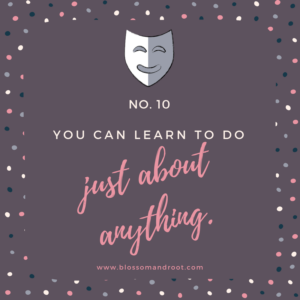
No. 10: You Can Learn to Do Just About Anything
People sometimes joke about the impracticality of a theatre degree, but they couldn’t be more wrong. Theatre taught me so much more than theatre. I learned dozens of practical skills–carpentry, sewing, budgeting, welding, and lassoing (seriously) amongst them–from theatre. I learned how to work with many different kinds of people from many different kinds of backgrounds. I learned how to problem-solve, think on my feet, and use resources in unexpected ways. I learned how to speak and sing in different languages and how to read and compose music. I learned how to take constructive criticism, how to ignore destructive criticism, and how to multi-task like a champ. I was constantly being challenged to step outside of my comfort zone, learn seemingly obscure skills (trapeze and sword-fighting come to mind), and to memorize and perform entire roles with only a moment’s notice.
I learned that I could do just about anything I put my mind to.
Theatre, and the arts in general, can teach your children all of this (and so much more.) The opportunities for personal, intellectual, and emotional growth are so abundant. And homeschoolers can reap the benefits as readily as any publicly-educated child. Here are just a few ways you can get your child involved in theatre:
- Encourage them to audition for roles in your local community theatre, or sign them up for their workshops, summer camps, or clubs.
- See if your local school district allows homeschooled children to participate in extracurricular activities, such as choir, drama club, dance troupes, or art classes.
- Form a co-op or club for homeschoolers where they can play improv games, do scene studies, or perform plays. Remember, you don’t have to have access to a formal “space” to perform meaningful, worthwhile theatre.
- If you are a religious family, see if your local church has a drama club (many of them do!)
- Check your local community center for classes in the arts that may be available to you.
- Attend theatre as often as possible–local high schools, colleges, community theatres, ballet schools, etc. can all be great places to see a wide variety of shows.
- Watch movies together, and have discussions together about them afterward.
Theatre and the arts can be such a rich addition to a well-rounded education, and a wonderful way for your child to make friends, develop confidence, and stretch their personal boundaries. Please feel free to share resources in the comments that other families might be able to use to bring the arts into their homeschools!
Get Your FREE Trial Issue of Book Seeds By Blossom & Root!

This FREE issue, inspired by the book The Three Sunflowers by Janet Lucy, includes two weeks of activities including nature study, STEAM, art project, recipe, and exploring language and poetry. Suitable for ages 3 - 8. Grab yours today!

